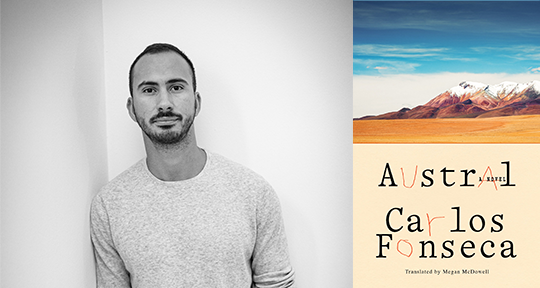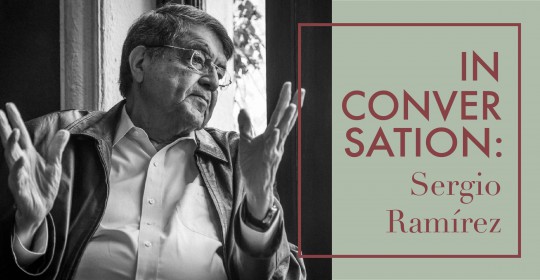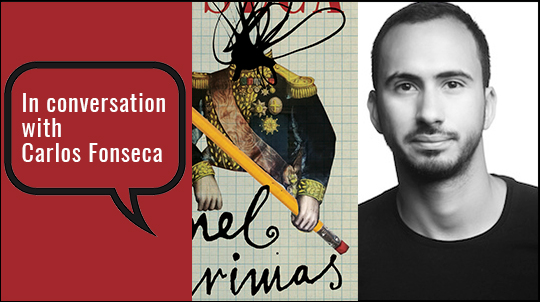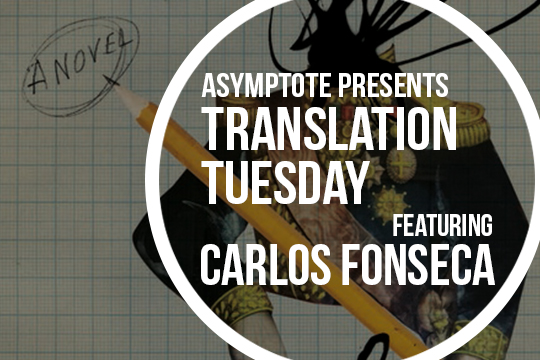This week, our team brings you literary news from around the world, including an experimental poetry reading and a festival celebrating comics! From cross-continental prize to a new exhibit at the Centre Pompidou, read on to find out more.
Alan Mendoza Sosa, Editor-at-Large, reporting from the United States
On February 7, I watched as the internationally-renowned Mexican poet and recent Asymptote contributor, Rocío Cerón presented a spellbinding performance at New York University’s KJC Center. Through sound, voice, and moving images, the performance expands on Cerón’s 2022 book Divisible corpóreo, a poetry collection that thematizes the relationship between language, poetry, and the body.
While Cerón read from the book, the screen behind her projected images featuring her bedroom and herself. These visuals were not static. Rather, they transformed in rhythmic syncopation along with Cerón’s voice. In addition, Cerón not only read the book out loud. She also brought her poems to a further experiential dimension through several resources grounded in her voice: she raised and lowered her pitch and volume, repeated words and phrases with different speeds, and sometimes elongated vowels and stuttered consonants. The effect was dreamlike. I was immediately thrown into a trance, a characteristic effect of Cerón’s awe-inspiring transmedia readings.
After the audience’s applause, Cerón was interviewed by Irma Gallo, a student in NYU’s Spanish MFA program. During this Q&A, Cerón reflected on her creative process and approach to live readings, noting that her performances often include improvisation, which makes each one of them a unique, ephemeral experience. She also talked about the feminist elements in her poetry, such as references to lineages of women writers and reflections on the mitochondrial DNA, only transmissible from mother to child. To conclude, she specified that the book Divisible corpóreo is the second installment of a trilogy that explores the connection between poetry and different senses. The other two books are Spectio (2019) and Simultáneo sucesivo (2023). Paraphrasing Cerón’s own words, these collections explore the interrelation between what we can observe and what we can hear. Each text establishes an intertextual dialogue with the other two “creating,” in Cerón’s words, “a network of signifiers and symbolic fields that touch and traverse one another.” READ MORE…









Compass and Rifle: On Roque Dalton’s Stories and Poems of a Class Struggle
No one escapes Dalton’s inquisitive pen . . .
Stories and Poems of a Class Struggle by Roque Dalton, translated from the Spanish by Jack Hirschman, Seven Stories Press, 2023
On Thursday, July 6, 2023, the inaugural day of Guatemala’s International Book Fair (FILGUA), the government of El Salvador requested organizers to exclude Salvadoran author Michelle Recinos’ Sustancia de hígado (F&G Editores) from the fair. The next day, online news outlet elfaro revealed that El Salvador’s ambassador in Guatemala had said, “It would’ve been an unpleasant thing for the government of El Salvador if this book had been a part of the fair.” Details are scarce, but presumably, this action was related to Michelle’s story Barberos en huelga, winner of the 2022 Mario Monteforte Toledo Prize, which openly criticizes sitting president Nayib Bukele’s war on gangs.
Hearing this, I can only imagine what Roque Dalton would have written about Bukele.
Roque Dalton’s Historias y poemas de una lucha de clases (Stories and Poems of a Class Struggle) dates back to 1975, and remains as timely as ever. In a time when most Central American countries are under authoritarian regimes and have experienced backslides of democracy, the life and work of Roque Dalton is at once a beacon of hope, an inspiration, and a warning sign. Historias y poemas de una lucha de clases is a book filled with courageous testimony, the poet’s typical dry humor, and bone-chilling depictions of state violence. Here, Dalton is hyperaware of the pain and plight of his compatriots, but in addition to his typical grittiness and social critique, we also find tenderness, softness, beauty, and frailty; Dalton’s acute perception is both a rifle and a compass, manifesting in words of both rebuke and encouragement.
READ MORE…
Contributor:- José García Escobar
; Language: - Spanish
; Place: - El Salvador
; Writers: - Alaíde Foppa
, - Carlos Fonseca
, - Ernesto Cardenal
, - Jack Hirschman
, - Jaime Barba
, - Julio Delfos Marín
, - Luis de Lión
, - Luis Melgar Brizuela
, - Margaret Randall
, - Michelle Recinos
, - Otto René Castillo
, - Roque Dalton
; Tags: - authoritarianism
, - Central American literature
, - class struggle
, - elfaro
, - F&G Editores
, - fascism
, - FILGUA
, - Mario Monteforte Toledo Prize
, - Salvadoran literature
, - Salvadoran poetry
, - Seven Stories Press
, - social commentary
, - social critique
, - state violence